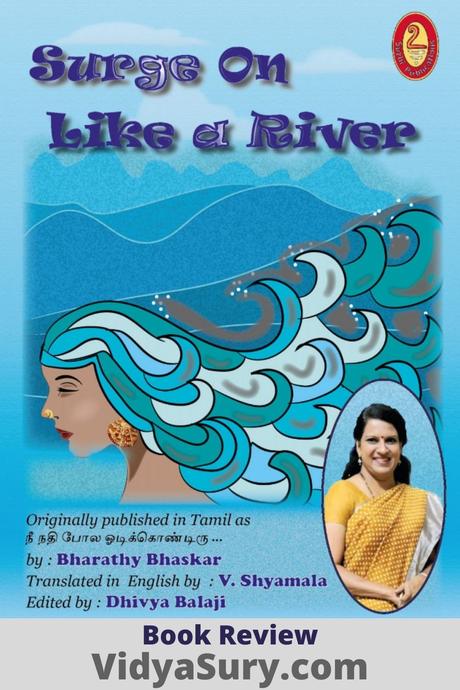When I heard that Bharathy Bhaskar's book " Nee Nadi Pola Odikondiru" (Tamizh) has been translated into English as " Surge On Like A River" I was curious. Happy to say it is just as delightful as the Tamizh version! Here's my book review.
Surge On Like A River - Book blurb
Surge On Like a River is the English translation of the Tamil book titled ' Nee Nadhi Pola Odikondiru ', written by Bharathy Bhaskar, a Chemical Engineer and an MBA, who is a banker by profession. She is also a popular columnist and speaker, and a household name in Tamil homes, thanks to the debates and shows she has spoken in.
The essays are written in a simple, engaging style, and filled with profound insights. These nuggets of wisdom primarily draw from the author's life experiences and her empathetic observations of the people and situations around her.
This English translation by V. Shyamala captures the lively nature of the original, bringing it to a wider audience with the idea that the readers who do not know Tamil should not miss out on the wonderful collection.
Buy the book at Amazon.in
or on Amazon.com
Surge On Like A River - My book review
I read the book in one sitting simply because it was an easy read and every chapter was in sync with my thoughts. The author insightfully explores a woman's life, how a woman is perceived in society, the trials she has to go through and yet, how she emerges strong as she survives through it all.
The premise of the book is just wonderful - women empowerment - as it goes straight to the heart. This is the kind of book we need to read.
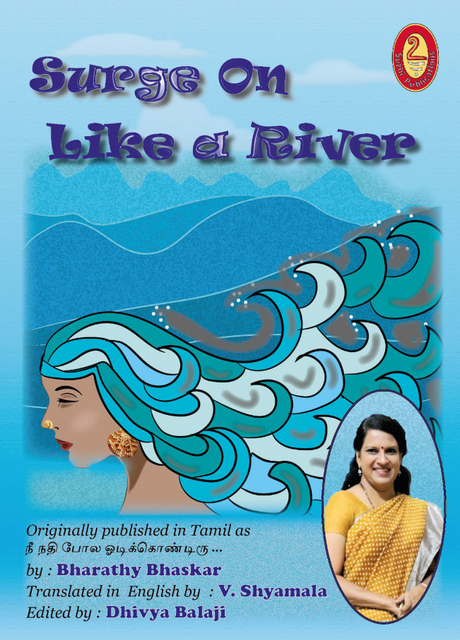
The author's introduction, "A word from my heart" where she talks about her mother had me in tears and I thought it was a fitting preamble to the book.
Each essay that follows in Surge On Like A River addresses the issues women face and transcend. Some of the stories are cringe-worthy while some will make your eyes glaze over with unshed tears - because we've all experienced at least some of these situations.
Although I thoroughly enjoyed reading every single essay, some did strike closer home than others. About being told to dress "appropriately", about being instructed not to be seen with boys and being scolded severely when someone did spot me exchanging words with one-and being grounded for it, being told that girls must be seen and not heard . . . even remembering these things makes my blood boil! Oh yes, so glad I rebelled at every instance.
One essay, "Shut up and move on" had me laughing so hard. The author's description of the contents of her handbag and fridge is so delightful.
The author says,
The leftover chutney made the day before yesterday morning and stuffed inside without having the heart to throw it away; and that chutney which, in cursed forgetfulness, we ground again in the night... will be inside. The glass of Boost that the son had only half-finished, and said 'enough', only for us to retort 'pour the remaining on my head' and which he had eventually kept in the fridge instead of pouring on our head... that will be there, too. Apart from this, two rotten chillies, half a tomato, and a few ants which had crept in search of coolness are also a part of the list.
The handbag's story is even more pitiable. The tablets for headache purchased long ago and kept in handbag for emergencies (thankfully the government officials who raid shops in search of expired stock of medicines have not yet started checking ladies' handbags), the sour toffees given by airhostess from a plane trip in the distant past, the betel leaves and turmeric given on visiting someone's home on an auspicious Friday, the rupee notes with Mahatma Gandhi's picture which looks like a woman bathed in turmeric thanks to that, the safety pins put in there to help in case of sudden urgent needs but which can never be found when needed, stickers, a dozen pens...
We've all been there, I am sure. We are all guilty of doing the things we would really like to change, aren't we?
I could describe each of the 20 essays in the book but I'll leave the pleasure of reading it to you.
The main takeaway from the book is for women to question the status quo without fear; that it is absolutely to fine to ask why when they are not treated as equals, when there are a different set of rules for women; when they are the ones who have to bear the brunt of the consequences of most "unacceptable" situations involving men.
I enjoyed the author quotes from various Tamizh literature books, authors and poets. For example: in the essay "Kitchen - a woman's prison?" she quotes from a poem by Vennila
"Who taught a child to hand over the milk packet in the morning to the mother and the newspaper to the father?""This is my home. My mother is cooking. My father is reading the newspaper. My older sister is sweeping the floor. My younger brother is playing..." is this not the content of lessons in the textbook of children studying in the second standard? It would be better to change this lesson to, "This is my home. My father is cooking. My mother is preparing a research thesis. Once her work gets over, my mother and father will cook together. My sister and I help too."
There are also essays of women who overcome their perceived shortcomings and take life in their stride, in spite of the hurdles they face, as we can read in Chapter 10 about Kamala Ma and her Credit Card and in Chapter 18. Dispel Fear - about Yamuna's zest for life even though she has lost her eyesight.
Women plod on until their last bit of strength and willpower is exhausted. They always worry about their children, no matter how old they are. And they deserve to be celebrated for everything they do, because they surge on like a river, regardless.
Yes - please do read Surge On Like A River - it is a thought-provoking book. You'll enjoy it!
Kudos to Shyamala for translating the author's wonderful Tamizh book and giving Surge On Like A River a larger audience. I do wish I had been given the opportunity to edit the book!
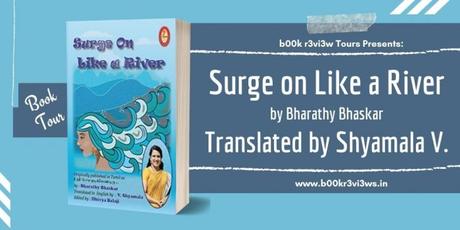
About the author
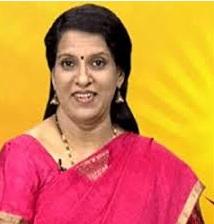
Bharathy Bhaskar is a Tamil Orator who is popular for her humorous debate talk shows called Pattimandram.com, telecasted on Sun TV. She is also an anchor for the daily talk show called Vaanga Peasalam at 7.15 a.m from Monday to Wednesday on Sun TV. Bharathy Bhaskar is also the Senior Vice President at Citi Bank, Chennai.
About the translator
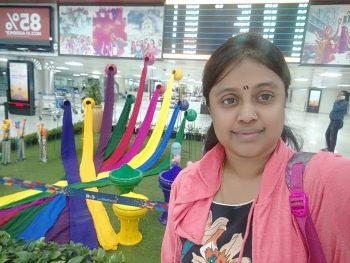
V.Shyamala is a cost accountant, a homemaker, and a writer. She loves to weave stories and is on a continuous quest to seek new and creative ways to teach children. When not writing, reading, or thinking up stories, Shyamala mentors CIMA students, strives to workout, loves tweaking South Indian heritage recipes, and translates Tamil words to English. She is also a member of AWIC (Association of Writers and Illustrators for Children) and volunteers at a local library twice a week.
Catch with Up V. Shyamala via Email | Facebook | Twitter | Instagram
